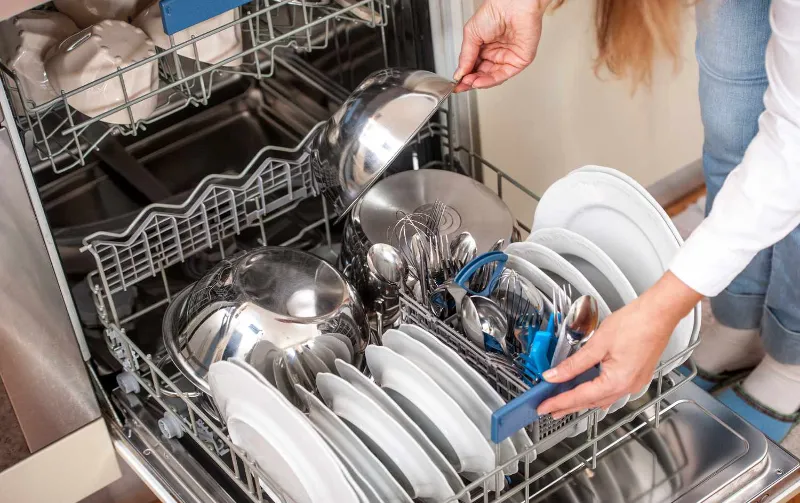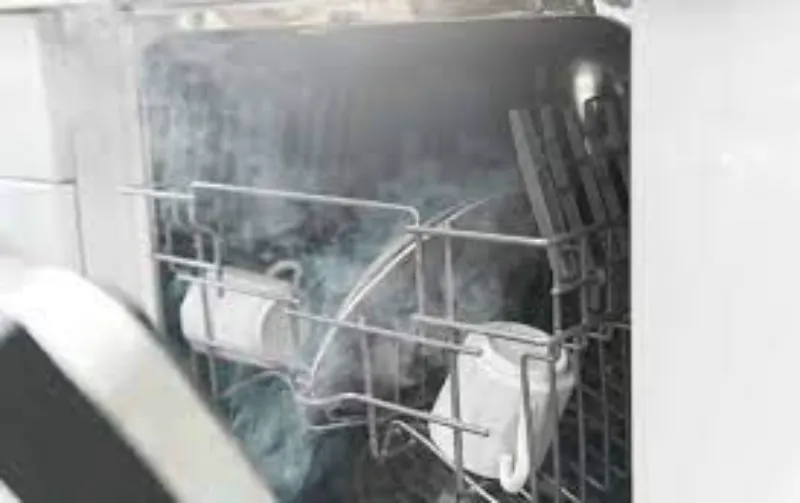Dishwasher water typically heats up to 130-170°F (54-77°C). This temperature range ensures effective cleaning and sanitation.
Dishwashers are essential kitchen appliances that not only save time but also guarantee a high standard of hygiene by using hot water to cleanse and sanitize dishes.
The temperature of the water is a critical element in its ability to break down food debris and grease, kill bacteria, and provide a thorough clean.
Many modern dishwashers come with built-in heaters that increase the temperature of the incoming water to the optimum level for cleaning.
This feature is particularly important for homes with lower hot water baseline temperatures to ensure that dishes come out spotless and germ-free.
Optimal dishwasher performance and hygiene standards depend on the machine’s ability to maintain these high temperatures throughout the cleaning cycle.

The Science Of Dishwasher Water Temperature
Understanding the science behind dishwasher water temperature is crucial for anyone who aims to achieve impeccably clean and sanitized dishware.
The temperature of the water plays a pivotal role in not only removing food particles and grease but also in ensuring that harmful bacteria are eradicated.
But how hot does the water actually get, and why does it matter?
Let’s dive into the hot springs of dishwasher thermodynamics and explore the essential aspects of water temperature within this common household appliance.
Importance Of Hot Water In Dishwashing
The role of hot water in any dishwashing process cannot be overstated. It is the zenith of cleanliness for several reasons:
- Hot water has an exceptional ability to dissolve fats and oils, preventing smearing and leaving dishes sparkling.
- Most dishwashing detergents are designed to perform optimally in hot water, which enhances their cleaning power.
- Higher temperatures eradicate germs and bacteria, ensuring a hygienic wash cycle.
- Hotter water can lead to faster cleaning times as the heat accelerates the chemical reactions needed to clean dishes efficiently.
Ideal Temperature for Effective Cleaning
Ideal Temperature For Effective Cleaning
To strike the perfect balance between energy efficiency and cleaning power, dishwashers generally heat water to an ideal range. The specifics:
| Setting | Temperature Range (°F) | Temperature Range (°C) |
|---|---|---|
| Normal Wash | 120-150 | 49-65 |
| High-Temperature Wash | 140-160 | 60-71 |
| Sanitization Cycle | Above 150 | Above 65 |
The recommended temperature for optimal dishwashing is usually around 120 to 150 degrees Fahrenheit (49 to 65 degrees Celsius).
This creates an environment hostile to microbes and softens stubborn food effectively.
Meanwhile, for households desiring an extra layer of germ-killing power or dealing with challenging food residues, advanced dishwashers offer a sanitization cycle that often exceeds 150 degrees Fahrenheit (65 degrees Celsius), meeting specific NSF/ANSI Standard 184 for sanitation.
Factors Affecting Dishwasher Water Temperature
The temperature of the water within your dishwasher is crucial for ensuring dishes come out clean and sanitized.
Several factors can impact just how hot your dishwasher water gets during a cycle.
Understanding these factors can help you optimize your dishwasher’s performance and longevity.
From the efficiency of the heating element to the initial temperature of the water supply, let’s dive into what could be affecting your dishwasher’s ability to heat water.
Heating Element Efficiency
The heating element is the powerhouse behind your dishwasher’s temperature.
An efficient element can quickly raise the water to the desired heat level, ensuring all residues and bacteria are effectively removed.
A few points demonstrating the efficiency of heating elements include:
- High-grade materials can produce heat more effectively.
- The wattage of a dishwasher’s heating element affects its ability to heat water.
- Over time, elements can cause damage, impacting their productivity.
A regular inspection and maintenance schedule can keep your dishwasher’s heating element in top shape.
Water Inlet Temperature
Your dishwasher’s performance is also contingent on the temperature of the water entering the machine.
This is often determined by your home’s water heater settings. Important considerations are:
- Ranging from 120°F to 150°F, the water heater’s set temperature affects the starting point for the dishwasher’s heating.
- Colder climates can lead to a decrease in initial water temperature during winter months.
- Piping insulation can help maintain water temperature as it travels from the heater to the dishwasher.
Ensuring your home’s water heater is set to an optimal temperature can aid your dishwasher in reaching the ideal cleaning temperature more efficiently.
Safety And Hygiene Standards
When it comes to domestic chores, your dishwasher is more than just a convenience; it’s a critical ally in maintaining the cleanliness and hygiene of your kitchenware.
To ensure the utmost safety, dishwashers are designed not only to remove the grime and food particles from dishes but also to reach temperatures that are high enough to kill harmful bacteria and germs.
This aspect of the dishwasher function is regulated for safety and effectiveness in sanitizing your utensils, pots, and plates.
Regulations On Water Temperature
Ensuring the effectiveness of dishwashers, health and safety regulations have been set in place.
These standards stipulate that the water inside a dishwasher must reach a temperature that is sufficiently hot to reduce the risk of contamination and the spread of germs.
Specifically, residential dishwashers often adhere to a minimum temperature of 120 degrees Fahrenheit, with many models offering cycles that can heat water up to 150 degrees or more.
These temperatures meet the standards required for safe operation and effective cleaning.
Sanitization And Bacteria Elimination
A hot water cycle in a dishwasher does more than just clean; it sanitizes. Elevated temperatures are crucial for bacteria elimination.
The thermal effect during a typical dishwasher cycle has been scientifically proven to kill 99.9% of bacteria and germs.
This not only provides peace of mind but is essential for preserving the health of you and your family.
- High-temp wash settings increase the temperature further for a more stringent cleaning.
- Some dishwashers come with a sanitization cycle, which is certified by the National Sanitation Foundation (NSF) and ensures the elimination of the maximum amount of germs and bacteria.
The importance of these features cannot be overstated, particularly for households with young children, elderly family members, or anyone with compromised immune systems.

Energy Efficiency And Cost-saving Measures
Understanding how hot your dishwasher water gets can lead to significant cost and energy savings.
As dishwashers are a staple in modern homes, optimizing their efficiency is key to reducing household energy consumption.
With an array of models and settings, you can align your dishwasher’s performance with energy-conscious practices without sacrificing cleanliness.
Effect Of Temperature On Energy Consumption
The temperature of the water in your dishwasher plays a pivotal role in the unit’s energy consumption.
Hotter water requires more energy to heat, leading directly to higher energy bills.
Most dishwashers have a built-in heating element that can raise water temperature to a range of 120°F to 150°F, with some models offering a ‘sanitize’ setting that goes even higher.
While a high temperature ensures thorough cleaning and disinfection, it’s important to understand its impact on energy use.
A standard dishwasher uses approximately 1.5 kWh on average per cycle, with the majority dedicated to water heating.
By adjusting the temperature settings or using energy-efficient cycles, users can reduce the amount of energy needed significantly.
It’s a balancing act between effective cleaning and energy savings.
- Many dishwashers come with eco-friendly settings that use cooler water and less energy.
- Appliances with Energy Star certification must meet strict efficiency criteria.
- Dishwashers with an internal heater can efficiently manage water temperature without engaging your home’s water heater, saving energy.
Tips To Optimize Water Heating
Maximizing your dishwasher’s performance while conserving energy can lead to cost savings.
Here are effective tips to optimize water heating:
- Lower your home water heater to 120°F. This prevents the need to raise the hot water temperature excessively for the dishwasher.
- A fully-loaded dishwasher uses the same amount of hot water as a partially loaded-one, so wait for a full load before running it.
- Opt for cycles that require less hot water and energy, like ‘Eco’ or ‘Energy Saver’ modes.
- If you are considering a new purchase, look for models that are Energy Star certified.
- Ensure your dishwasher is well insulated to maintain heat and reduce the energy required for water heating.
- Regularly clean and maintain your dishwasher to keep it running efficiently.
It’s clear that the temperature setting on your dishwasher doesn’t just affect how clean your dishes come out; it also has a significant impact on your monthly utility bills.
By implementing these energy and cost-saving measures, you can enjoy sparkling dishes and a happier wallet.
Frequently Asked Questions Of How Hot Does Dishwasher Water Get
What Is The Standard Dishwasher Water Temperature?
The standard temperature for dishwasher water is about 130°F (54°C).
Can Dishwasher Temperatures Kill Bacteria?
Dishwasher temperatures above 145°F (63°C) can effectively kill most bacteria.
How Does Dishwashing Temperature Affect Cleaning?
High temperatures increase detergent effectiveness, improving cleaning and grease removal.
What Safety Measures Control Dishwasher Heat?
Dishwashers have thermostats and other sensors to regulate heat for safety.
Conclusion
Understanding the temperature ranges of dishwasher water is crucial for effective cleaning.
Most units typically reach 120-160°F, ensuring a hygienic rinse.
To maximize efficiency and safety, check your model’s specifications and consider the type of detergent used.
Proper maintenance promotes optimal performance. Stay informed for sparkling results every cycle.
